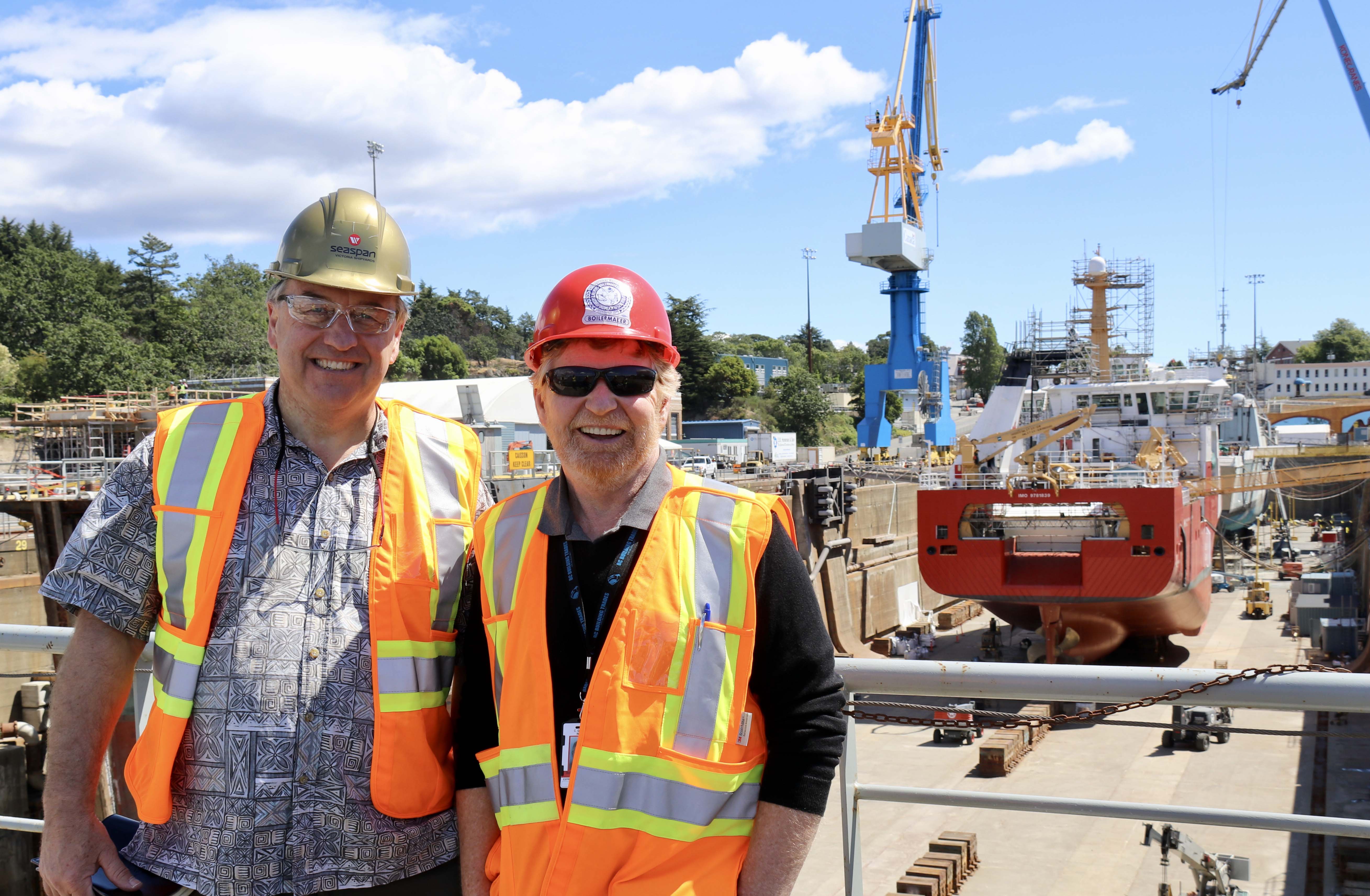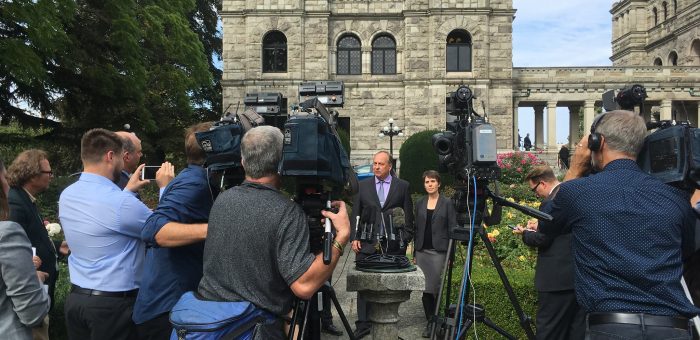Education
On Ontario’s cancellation of its basic income pilot
Over the last week, I have been following the news that Ontario has decided to cancel its basic income pilot, only one year into what was supposed to be a 3-year project.
I am saddened by the decision made by the government of Ontario, for a number of reasons.
I was, of course, looking forward to learning from Ontario’s pilot project, which would have provided a wealth of evidence about the effects of basic income. Ontario was leading the country in assessing the impacts of this policy, and their project was being watched around the world. They were tracking changes in employment, health, education, food security and housing, as well as community-level effects in Lindsay, with independent assessment by university researchers.
Before Ontario, the last pilot in Canada took place in Dauphin, Manitoba, over 40 years ago. This pilot illustrated some very promising results: in just 3 years, hospital visits were reduced by 8.5%.
Researchers attributed this marked decrease to lower levels of stress in low income families, which resulted in lower rates of alcohol and drug use, lower levels of domestic abuse, fewer car accidents, and lower levels of hospitalization for mental health issues.
In deciding to cancel the pilot, Ontario, and our whole country, has lost a significant opportunity to learn about the effects of basic income and to be on the leading edge of exploring this policy.
But what has struck me the most in the last week since the news of cancellation are the individual stories coming out of Ontario, from those enrolled in the pilot, whose lives are deeply affected by this decision.
So many stories have highlighted how people’s lives changed once they began receiving basic income. These stories have highlighted, too, the substantial human cost to cancelling this pilot part way through, when thousands of people had made plans and decisions on what they thought was stable ground.
Some participants in the pilot decided to attend college for the first time, or returned to school, to pick up the skills needed for meaningful employment or to start a new career. Others began living independently, or found secure accommodation for the first time. For some, it was the newfound ability to afford healthy food and other small things to improve the quality of their lives, and the lives of their children. Others used the income to pay down long-standing debts.
Many spoke about the reduced stress they felt, the ability to plan into the future instead of worrying only about the day-to-day, and a feeling of greater independence and dignity.
Many participants in the program were working, but still couldn’t afford the necessities of life and make ends meet.
One individual who was part of the pilot wrote to me highlighting the impact that basic income had on him and his family. Despite both working, he and his wife had amassed a significant amount of debt, which they struggled to pay off as they tried to provide for their children. The program, he said, was allowing them to pay down their debt and do more with their children. Most importantly, he said, he could finally see the light at the end of the tunnel to better days, for him and his children.
In his words, “this program … gave people that really needed hope a lot of hope for a brighter future.”
These individual stories speak to the promise I believe basic income holds – as a better way to support people as they navigate the economic challenges of the 21st century. Recent years have seen disproportionate increases in part-time and contract work. Wages have stagnated while the cost of living in our cities has spiralled out of control. Meanwhile, studies estimate that half of Canadian jobs could be impacted by automation in the next decade alone. We proposed exploring basic income in B.C. because we believe that government needs to have a plan for the changes on the horizon.
The experiences of people in Ontario has made me see even more strongly the need to do serious work exploring this policy. I have previously written a four part series (Part I, Part II, Part III, and Part IV) outlining why I think basic income is an idea that we need to explore in BC. Establishing a pilot project formed a key aspect of the Income Security component of our BC Green 2017 election platform.
We’re forging ahead in BC with our expert committee, an expert panel comprising three distinguished researcher that launched last month and is studying how basic income could work in BC. This committee is the first step towards fulfilling a government commitment under CASA to pilot basic income in BC. I am hopeful that the committee’s work will provide the evidence that governments need to decide how to proceed – not only here in BC, but across Canada.
In this time of change, as we grapple with the challenges we face today and on the horizon, policymakers have a responsibility to plan for the future, and to make decisions that will give their citizens the best possible chance to pursue their dreams and to achieve success. In a country as wealthy and as compassionate as ours, that’s the goal our leaders should be working towards.
Community benefits agreements & the proposed BC Infrastructure Benefits Inc.
Earlier this week the BC government announced 2 public infrastructure projects that will be delivered under “Community Benefit Agreements” (CBAs), and the creation of a new Crown corporation, BC Infrastructure Benefits Inc., (BCIB) that will oversee the implementation of these agreements.
In response to media requests on this announcement we issued the following statement :
“Community benefit agreements are a great way to invest in our province’s future and a key tool that government can use to advance social and environmental goals. In particular, investing in training and apprenticeships for young people, First Nations and women will help set those British Columbians up for long-term success, which will have significant knock-on benefits for our province and its communities.
I look forward to seeing the details of the government’s overall framework. I will be looking to ensure that it is fair and effective from a policy perspective, rather than a political or ideological one. While our caucus’ approach to labour policy differs in some respects from the BC NDP’s, I believe there are significant opportunities for us to collaborate to modernize BC’s laws so that we can best set British Columbians up for success amidst major global economic shifts.
I look forward to seeing the details of this agreement and working with Minister Bains to meet our CASA commitment to find innovative ways to improve fairness for workers.“
In response to a number of questions, I wanted to expand on this statement.
Without a doubt, CBAs can be a good policy tool to accomplish important objectives for public construction projects, such as increased apprenticeships, increased participation for indigenous trades workers, women and other underrepresented groups, commitment to local hiring, and more certainty on wages on project timelines.
A strong building trades labour force is critical for our province’s future. To meet our climate targets and build a stronger, sustainable economy, we are going to need to make significant investments into our existing building stock, as well as building new infrastructure including public transportation. We also need to ensure our workforce develops, in particular by ensuring that there are enough apprenticeship opportunities to train new workers.
However, CBAs must be advanced as a policy tool to address the values I outlined above – not as a tool to pay back political favours or to advance ideology at the expense of good policy. We have made this perspective clear to the government, and will be applying this approach to reviewing how the government awards Community Benefit Agreements in the future.
We have also asked government to provide reasoning for why the two projects announced earlier this week had a unionization requirement for workers on these two sites.
It is our view that CBA should be applicable for both union and non-union trade shops and that we are focused on ensuring that whoever is competing for a contract is meeting the requirements laid out in the CBA. To be clear – CBAs can be good policy, providing a good tool for government to help drive the development of a strong building trades labour force, as long as we use them for policy not partisan reasons.
One year later, CASA continues to deliver strong, stable government that puts people first
Today the BC Green and BC NDP caucuses celebrated the one year anniversary of the signing of our historic Confidence and Supply Agreement.
The Premier and I took the opportunity to celebrate the event at the offices of Alacrity Foundation in Victoria. This was a fitting venue since Alacrity represents a stellar example of innovation in the new economy.
Alacrity has helped bring over $225 million to B.C.’s technology ecosystem through its investor readiness program and on April 19, 2018, the Province announced that it was investing more than $711,000 over the next three years in the Alacrity Foundation of B.C.’s Cleantech Scale-Up program.
Below I reproduce the brief remarks I gave at the event as well as our joint press release.
My remarks
I am delighted to be here to celebrate the one year anniversary of the announcement that we had reached a Confidence and Supply Agreement with the BC NDP.
The 2017 election was historic for our Party. We doubled our popular vote count and tripled our seat count.
When the results came in as a minority government, we felt an enormous weight on our shoulders. We took our decision very seriously.
In the end, we decided BC needed a change. It was clear that most British Columbians wanted things to be done differently.
There was a clear desire for bolder, forward-looking policies on a range of important issues:
affordability;
environmental protection;
investments like child care and public education that will give our children the best possible future.
CASA is the result of two distinct parties coming together around shared values.
Ultimately we want the same thing:
to improve the health and wellbeing of British Columbians;
to make government more responsive to the challenges and opportunities they face in their everyday lives;
and to set our province up for success.
There have been ups and downs in the first year, but like any relationship our Agreement has required us to work through our issues and come together to find solutions that we can both support.
This is a special opportunity – under majority governments, a party can get 100% of the power with as little as 39% of the vote and push through its agenda without having to consult or collaborate with any other parties.
This has often left British Columbians feeling disconnected and like their government is not listening to their concerns. In just the first year since signing our agreement, we have worked together to:
ban big money;
reform the lobbying industry;
make historic investments in childcare and public education;
advance key elements of the BC Greens’ economic vision for the province.
And we’re just getting started.
Right now, I am hard at work with Minister Heyman to develop a climate plan that puts a bold vision for BC’s economy centred around innovation at its core.
We have a unique opportunity to make BC a leader again in climate action.
While climate change poses significant risks and challenges, there are opportunities to be had as the world transitions to the low carbon economy.
But the benefits will only flow to those who are leaders – not the last adopters.
BC was once a leader in climate action, providing an example to the world that a strong economy and bold climate action are perfectly compatible.
I am looking forward to unveiling our plan to make BC a leader once again.
There are challenges that lie ahead, but I am deeply encouraged by our ability to come together to work through our differences.
John and I both know that there is more at stake than the future of our two parties – we are united in our love of this province and we want to set it up for the best possible future.
Our caucus remains committed to doing everything we can to work collaboratively to advance more solutions so that we can deliver on our shared commitments to the people of BC
Thank you.
Joint Media Release
| For Immediate Release 2018PREM0081-001062 May 29, 2018 |
Office of the Premier Office of the Leader of the B.C. Greens |
One year later, CASA continues to deliver strong, stable government that puts people first
|
|
| VICTORIA – Premier John Horgan and B.C. Green Caucus Leader, Andrew Weaver, marked the one-year anniversary of the Confidence and Supply Agreement (CASA) at the Alacrity Foundation in Victoria.
The leaders highlighted co-operation to put people first, and investment in clean tech, innovation and a resilient economy that creates good jobs for people in B.C. — now and into the future. “When we agreed to CASA, we agreed to make democracy work for people and focus on solutions to the challenges facing British Columbians,” said Premier Horgan. “By working together, we’ve accomplished a lot to make life more affordable, improve the services people count on, and build a strong, sustainable economy that works for people. And we will keep working together, every day, to make life better for people in B.C.” The Province recently announced support for the Alacrity Foundation to help clean tech companies expand. The support for Alacrity is part of the progress made on CASA commitments to advance innovation and technology, and the collaborative work on the climate action strategy that continues. “Over the last year, we’ve shown the people of B.C. that co-operative government can lead to better, evidence-based policies that will set our province up for a bright future,” said Weaver. “Core elements of our economic platform are part of CASA. With the establishment of the Emerging Economy Task Force and the appointment of B.C.’s first innovation commissioner, the province will be better positioned to adapt and prosper in the changing economy of the 21st century.” CASA commitments on climate action were emphasized by both leaders, as they stressed the importance of decisive action and ongoing work to ensure B.C. is a climate leader. “Climate change affects everyone, and our shared future depends on making B.C. a climate leader with a strong economy that works better for people and the environment,” said Premier Horgan. “The previous government stalled climate action and failed to meet targets. We are working collaboratively towards a credible and effective climate strategy that creates opportunities for people. I’m excited about what we can achieve together.” The Government of British Columbia recently introduced legislation to update the Province’s greenhouse gas reduction targets, setting the stage for a renewed climate action strategy to be released in the fall. “There is much more to be done, but I look forward to working together to make B.C. a leader in climate action once again,” said Weaver. “We have an incredible opportunity to build a thriving economy centred around innovation, and keep our commitment to younger generations. A climate plan that is a collaborative effort by two distinct parties is a unique chance to put people ahead of politics, to think beyond the typical electoral cycle and set our province up for the brightest possible future. British Columbia has so much to offer and we can and shall be a leader in the new economy.” In addition to growing B.C.’s tech economy, supporting innovation and making B.C. a leader in climate action, CASA lists child care, team-based health care and housing as priorities. Quick Facts:
Learn more: To learn more about the CASA Secretariat and agreement, visit: https://www2.gov.bc.ca/gov/content/governments/organizational-structure/ministries-organizations/central-government-agencies/government-communications/casa To learn more about Alacrity’s BC Cleantech Scale-Up program, visit: https://www.alacritycanada.com/programs/ |
|
Contacts: |
|
| Jen Holmwood Deputy Communications Director Office of the Premier 250 818-4881 |
Jillian Oliver Press Secretary B.C. Greens 778 650-0597 |
Supporting BC’s digital technology supercluster initiative
Today in the legislature I rose during question period to ask the Minister of Jobs, Trades and Technology about the provincial government’s support for the recently announced BC-based digital technology supercluster consortium.
The B.C.-based Digital Technology Supercluster consortium was selected in February as one of five successful national programs to share a portion of $950 million in federal innovation funding. More than $500 million in private sector funding has also been committed to the BC-based supercluster project.
Below I reproduce the video and text of the exchange.
Video of Exchange
Question
A. Weaver: In February, B.C.’s economy received a huge boost with the news that our digital supercluster won over $150 million in federal funding. The supercluster offers an opportunity to bring together the private sector and our post-secondary institutions and government to solve problems and accelerate innovation in key sectors in our province, like health care, forestry and manufacturing. This will help B.C. be more competitive as we respond to changing global trends.
The supercluster will generate more than $5 billion in GDP growth and tens of thousands of jobs over the next ten years. It already has hundreds of millions of dollars in federal funding and private sector commitments, with over 300 partners.
For the province to be able to participate in this groundbreaking initiative, all we need to do is contribute $1.5 million per year for five years. My question to the Minister of Jobs, Trades and Technology is this: will this government seize the opportunity before them, make at least the minimal contribution required and take a seat at the table of the digital supercluster?
Answer
Hon. B. Ralston: I share the Leader of the Third Party’s enthusiasm for the supercluster proposal. The federal government took the initiative by creating a fund and having a nationwide competition. British Columbia put together a consortium, as the member has mentioned, of over 300 companies — institutions, non-profits, start-up companies — led by some of the biggest companies in the province, and was successful. It has huge potential to create jobs, economic activity and research here in the province.
Just this week, the supercluster group appointed Sue Paish, who will be known to many people here, as the CEO of the supercluster. The structure, the governance model, is all being worked out. She just was hired earlier this week. Once that structure is in place, we will certainly consider provincial options to support this exciting initiative.
Supplementary Question
A. Weaver: The digital supercluster provides a generational opportunity for this government. Familiar words, actually.
Government can bring the biggest issues B.C. faces to the table, harnessing the ingenuity of our private sector and our exceptional post-secondary institutions to find innovative solutions to our most complex and difficult problems: in areas like, for example, health care, where precision health can enable more effective and targeted treatment for patients; or in areas like our natural resources and manufacturing sectors, where partnerships will increase efficiency and productivity, creating more jobs in rural B.C. and helping us get better returns for our products.
My question, again, is to the Minister of Jobs, Trade and Technology. Why wouldn’t government do everything in its power to support this initiative and to make sure that it has a seat at the table — that it seizes the power of this supercluster to tackle the most pressing challenges we face today?
Answer
Hon. B. Ralston: Indeed, that’s exactly what the government is doing. This opportunity is a very exciting one. There are some challenges, as Sue Paish puts together her team, devises a government structure. There are some issues about the ownership of IP that will come out of the research that’s going to be done, the way in which the funds will be divided among the companies involved.
So there are some challenges. I’m convinced that the group is definitely up to it. We are excited by the opportunities.
As the member mentions, there are huge challenges that we here in British Columbia can solve. In fact, just today, over across the water, at the tech conference, there is a group of 3,000 people meeting, talking about the opportunities presented to all regions of the province, all citizens of the province, by the promise of the digital transformation that we’re undergoing.
The supercluster is part of that, and we intend to do our part in spurring that group on to success.
Reimagining Masculinities Conference 2018
Today I had the distinct honour of providing the opening remarks at the Reimagining Masculinities Conference 2018 held at the University of Victoria.
As noted on the conference website:
ReImagining Masculinities is cultivating meaningful conversations about healthy, non-violent masculinities. Our hope is to inspire empathy, action, and self-reflections through conversation, education, and awareness.
Online streaming of the conference is also available.
Below I reproduce the text of my opening remarks.
Text of Opening Remarks
Opening statement – Reimagining Masculinities
Thank you everyone for being here today to explore an issue that isn’t often discussed in such a public setting.
I’ve been given the opportunity to say a few words about Reimagining Masculinities and as both a professor at UVic and MLA for this riding, it is my absolute pleasure to do so.
Please keep in mind that I teach climate science rather than gender studies, but I will do my absolute best.
This conference is such an accomplishment, not only because of the topic, but because of the breadth of talent represented as well.
Paul Lacerte has many fans in the legislature who are proud to wear their moosehide campaign pins and I hope everyone here today will pledge to get involved.
We could surely all benefit from more poetry in our lives and I know Councillor Jeremy Loveday will show that politicians can have a way with words.
The links between Tanille Geib’s Healthy Relationships workshop and Allan Wade’s analysis of colonial masculinities show just how complex this topic really is.
When I consider toxic masculinity, it is not hard to make connections to the events that we hear about every single day.
Whether it’s disgraced actors or the tragedy in Toronto, the MeToo movement has highlighted just how big an impact toxic masculinity has on all of us.
It’s possible that until recently a lot of men may not have realized the extent of abuse that women have always had to deal with.
On the other hand, I want to avoid the idea that the only role men can play in the movement is of the accused.
This conference is a prime example of the role that men can play in addressing this problem, and it’s something that I have always tried to do as an MLA.
Through collaboration with the previous government, I was able to ensure that legislation passed to require all universities and other postsecondary institutions in British Columbia to implement comprehensive sexualized violence and misconduct policies.
My hope was that survivors of sexualized violence on campus would be better supported by their schools, and that the process would be more transparent for all involved.
Based on our initial consultations it appears as though this has been the case. I thank Kayla Phillips, who has been working diligently in our BC Green Caucus as a legislative intern.
She has been spearheading our efforts to determine the effectiveness of the legislation that we introduced two years ago.
I was also able to introduce and get implemented a law that banned employers from requiring their employees to wear high heels which had been a problem particularly in jobs like serving where women have traditionally been subject to high levels of sexual harassment.
While it has not righted all wrongs in the industry, I have spoken with many women who are happy to no longer fear losing their job for refusing to wear painful footwear.
This conference also highlights the importance that intersectionality plays when considering toxic masculinity. This is not simply an issue of masculine men and feminine women, but a whole spectrum of those with varying identities impacting their own experiences.
I encourage anyone involved in tackling toxic masculinity and its effects to think outside our standard binaries for innovative solutions, such as we have here today.
I would like to thank hosts Scott Thompson & Steven Hao as well as the organizers, including Nick Sandor, for asking me to speak today.
I’d now like to introduce Member of Parliament for Winnipeg South and Parliamentary Secretary for the Status of Women, Terry Duguid.
Terry’s appointment in this role is a great example of how the status of women in Canada is not a responsibility that rests solely with women, and the part that everyone has in addressing it.
While Terry can’t be here in person, he can tell you more about his role through this video:
I’m also lucky enough to be joined by MLA for Esquimalt-Metchosin, Mitzi Dean. Mitzi was recently named Parliamentary Secretary for Gender Equity in BC and it’s hard to imagine a better choice for that role in the legislature.
Before her election last year she had spent many years advocating for women and children in various parts of the world and with the U.K.’s largest child protection charity. She now brings that experience to share with you today.








